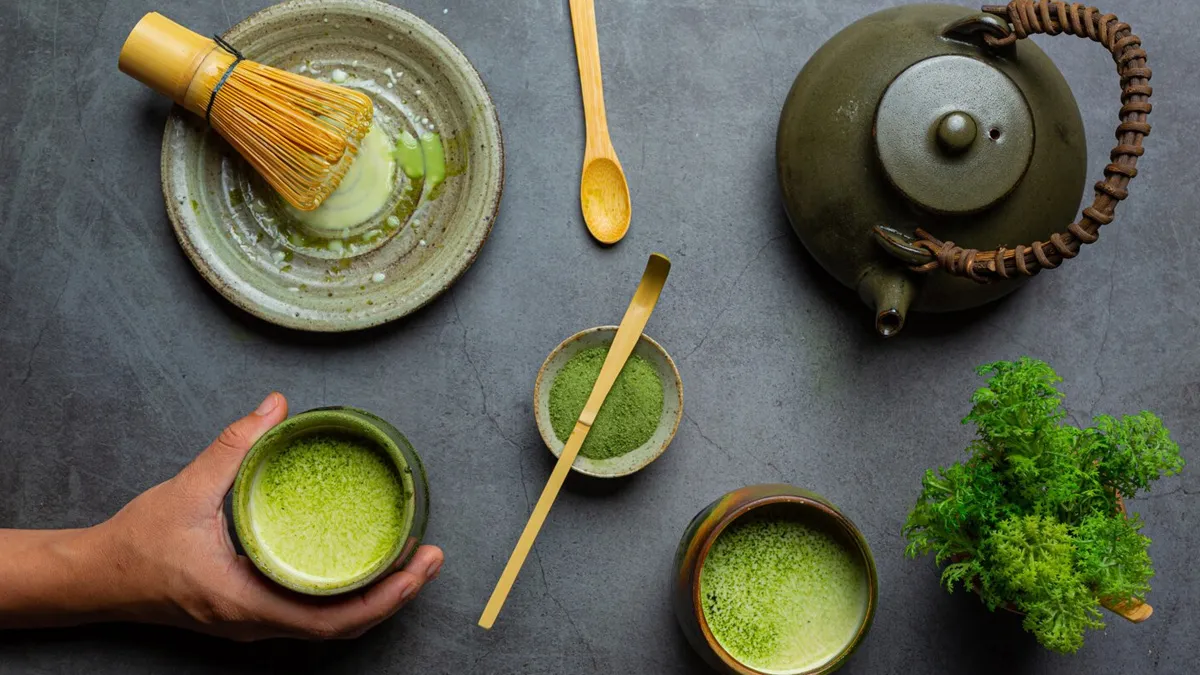
If you are someone who loves to try healthy drinks, then you must have heard about matcha by now. This green coloured foamy drink has gained immense popularity in recent years. Social media and wellness enthusiasts have popularised it further. Did you know matcha tea has varied health benefits? This green tea is rich in antioxidants and catechins, which provides various perks for health. Read on.
Table of Content:-
What Is Matcha Tea?
Matcha is a type of green tea, found in powdered form. It is made from finely powdered dried tea leaves. The powder when whisked into hot water forms a frothy drink. The entire act of preparing, presenting, and sipping matcha forms the backbone of the Japanese tea ceremony. It’s been the cornerstone of traditional Japanese tea ceremonies for centuries. But recently, it has become popular in the US and other parts of the world because of its varied health benefits. Matcha also acts as a cooking ingredient, used in everything from ice cream to salad dressing.
(This article has been verified and vetted by Dt. Avanee Parekh, BHSc, PG Dietetics).
Health Benefits of Matcha Tea
Matcha is richer in nutrients like theanine, vitamins, and fiber than other types of green tea. It is used as powder in tea, lattes, smoothies, and also baked goods. Let’s take a look at some of the probable health benefits of matcha:
Promotes Heart Health
The compounds that are present in matcha are similar to those in green tea. This has been shown to lower the risk of heart disease. Matcha contains catechins, which may lower oxidative stress and prevent inflammation. Catechins are also very good for the heart and might lower your risk of atherosclerosis, high blood pressure, and heart disease.
Improves Brain Function
Matcha may provide a boost to one’s brain. It has also been linked to better attention, memory, and response time. This may be owing to its caffeine content. More research is needed on this topic though.
Protects Against Cancer
Catechins in matcha, especially epigallocatechin-3-gallate (EGCG), may shield cells from DNA damage and slow growth of tumor. Some studies on animals discovered that EGCG might prevent cancer, but more research is needed on this topic.
Supports Dental Health
EGCG, present in matcha, can help slow bacterial growth that are responsible for plaque and cavities. Matcha has also been found to be better at reducing bad breath. It might also help lessen symptoms of gum disease.
Lowers Inflammation
Antioxidants in matcha may protect cells against damage from free radicals. This can help lower inflammation and prevent chronic health conditions like diabetes and heart disease.
Also Read: https://www.onlymyhealth.com/matcha-green-tea-benefits-for-mental-health-12977839067
How To Prepare Matcha Tea
Matcha doesn’t have a very long shelf life. Once you open the packet, try to use it within two months for the best taste and colour. All you need to prepare matcha tea is matcha powder, hot water, a whisk and sweetener (optional). Now, let’s take a look at how to prepare matcha tea:
Sift It Well
Before adding it in water, sift it well. Otherwise, the matcha powder will form lumps, which might make it difficult for the tea to disperse evenly in the water.
Whisk The Matcha
Whisk the matcha vigorously from side to side – either in a zigzag pattern or directly back and forth. This evenly disperses the powder in the liquid and gives a foamy layer on top. Avoid whisking in a circular motion.
Top It Off With Milk
You can top your matcha tea with steamed milk. This is optional though. Matcha tea is generally made with its powder and hot water.
Possible Side Effects Of Matcha Tea
There are possible side effects and risks related to matcha consumption. This is because matcha contains both beneficial and harmful substances. Consuming more than 2 cups (474 mL) of matcha per day is not recommended generally. Some studies cite the following side effects of matcha:
- Matcha may cause nausea and symptoms of liver or kidney toxicity.
- Caffeine content in matcha may lead to insomnia, irritability, or rapid heartbeat.
- Consuming matcha in large quantities may cause stomach issues.
- Catechins in matcha may restrict iron absorption in the body.
Conclusion
Matcha is a Japanese green tea. It is richer in nutrients like caffeine, theanine, vitamins, and fiber than other types of green tea. From promoting heart health to supporting dental health, matcha has myriad health benefits. More research on this topic is needed though. It is advised to consult a physician before including matcha to your daily diet.
Also watch this video
FAQ
Does matcha have caffeine in it?
Yes, matcha has high caffeine content. It is typically higher than that of other green teas.Is matcha tea good for belly fat?
Yes, matcha can be good for reducing belly fat because of its high concentration of catechins, especially EGCG.Is it good to drink matcha tea every day?
Yes, it is generally good to drink matcha tea every day, as it is packed with antioxidants and other beneficial compounds that support heart and brain health.What is the best time to drink matcha tea?
The best time to drink matcha is typically in the morning or before a workout for improved performance and fat oxidation.What are the side effects of drinking too much matcha tea?
Drinking too much matcha may lead to various side effects including insomnia, anxiety, jitteriness, rapid heart rate, digestive issues like an upset stomach, diarrhea, or constipation.
Read Next
How Omega-3 Fights Inflammation Naturally: Expert Shares Benefits and How It Works in the Body
How we keep this article up to date:
We work with experts and keep a close eye on the latest in health and wellness. Whenever there is a new research or helpful information, we update our articles with accurate and useful advice.
Current Version
Oct 07, 2025 10:57 IST
Modified By : Shruti DasOct 07, 2025 10:57 IST
Modified By : Shruti DasOct 07, 2025 10:57 IST
Published By : Shruti Das